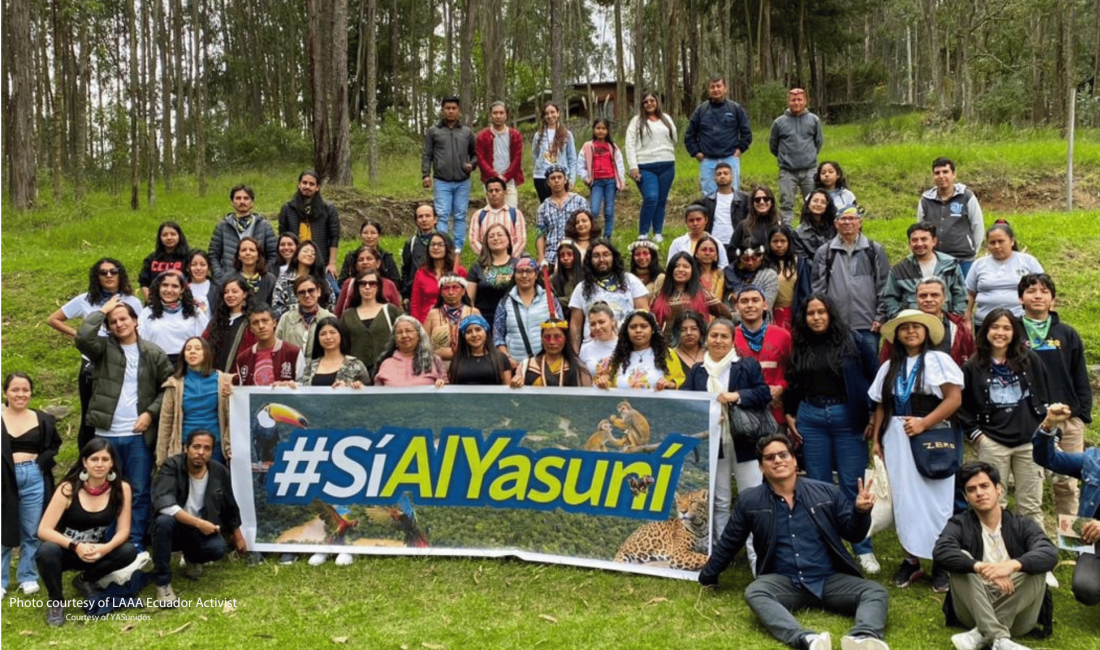Ecuador voted. The people spoke. But the government is stalling.
There are important new updates to the Yasuní referendum in Ecuador—an ongoing case of what citizen-led democracy can accomplish, and what is at stake when its outcomes are ignored. A landmark ruling confirms Ecuador’s failure to protect indigenous populations and its obligation to execute the referendum decision without delay.
In August 2023, Ecuadorians made history. Through a national referendum, nearly 60 percent of voters approved a legally binding measure to end oil drilling in Block 43 of Yasuní National Park—one of the world’s most biodiverse regions and home to Indigenous peoples living in isolation (IPI).
The YASunidos movement, supported by Indigenous communities, environmental groups, and civil society, fought tirelessly for the right to decide the future of Yasuní. The result was not only a political statement—it was a constitutionally guaranteed act of direct democracy. The referendum was conducted under Article 104 of Ecuador’s Constitution, which grants citizens the right to call for a national vote on matters of fundamental interest.
The outcome was clear: leave the oil in the ground, protect nature, and uphold the rights of Indigenous peoples. It was a landmark moment for both environmental protection and direct democracy.
But more than a year later, that democratic decision has not been honoured.
Despite a clear constitutional obligation to implement the vote within one year, the government has taken no meaningful action. There is still no withdrawal plan, no budget, no schedule. The state oil company, Petroecuador, has not only failed to meet its own (already extended) deadlines but has also ceased to report transparent data on oil production from Block 43—effectively concealing the extent of ongoing extraction.
Instead of closing wells as ordered, the company now claims the process will take five years, yet it has already missed its first internal milestone. Only one well—symbolically—was shut down on the anniversary of the referendum. Furthermore, in December 2023, Petroecuador merged production figures from Block 43 with those from neighbouring fields, making it impossible to verify whether any real progress has been made.
This is not merely a policy delay. It is a direct challenge to constitutional democracy and the rule of law.
The Inter-American Court of Human Rights (IACHR) issued a landmark ruling. It found that the Ecuadorian state had violated the rights of the Tagaeri and Taromenane peoples, particularly by permitting extractive activities in protected areas of their territory.
Crucially, the IACHR referenced the 2023 referendum explicitly:
“The Ecuadorian State is obligated to implement without delay the popular mandate ordering the cessation of oil exploitation in Block 43.”
This ruling, publicly communicated in March 2025, followed a formal case brought forward by YASunidos and the Confederation of Indigenous Nationalities of Ecuador (CONAIE). It confirms that the state failed to protect Indigenous peoples in isolation.
Paragraph 504 of the decision sets a powerful precedent—reaffirming that democratic mandates, especially those protecting Indigenous and environmental rights, are legally binding and must be upheld without delay.
The judgement also reaffirmed the importance of the principle of “no contact” for Indigenous peoples living in isolation. This principle, grounded in Ecuador’s Constitution and in international human rights law, protects the right of these communities to live in peace, on their land, and without external interference. Their territory is legally recognised as ancestral, irreducible, and intangible—and must be treated as such.
This moment matters far beyond Ecuador.
The Yasuní referendum has become a global reference for how modern direct democracy can shape climate policy from the ground up. But the strength of direct democracy lies not only in the right to vote in a referendum—it depends on the full implementation of what the people decide.
When governments fail to act on the result of a legally binding referendum, it sends a dangerous message: that democratic mechanisms can be disregarded, and that citizens’ voices—even when protected by the Constitution—can be ignored.
Democracy International stands with the citizens of Ecuador, the YASunidos movement, and the Indigenous communities of Yasuní.
In our series Life as an Activist we cover the stories of activists who use the democratic tools available to them to take action and direct impact on the issues that matter most.
The Yasuní referendum is one such story—clear proof that when people speak, their voices must be heard. When citizens vote, governments must listen. Anything less is a failure of democracy.




